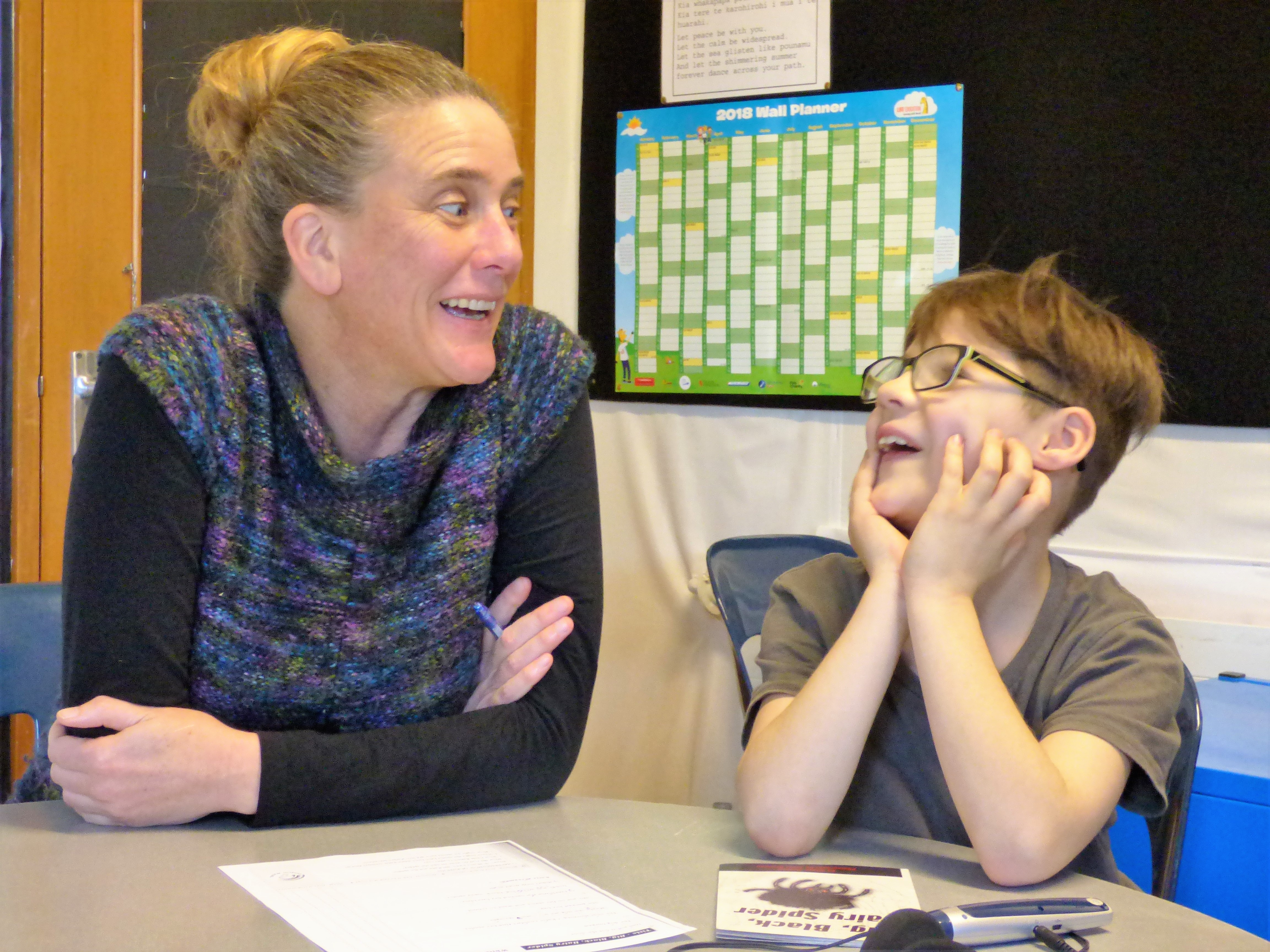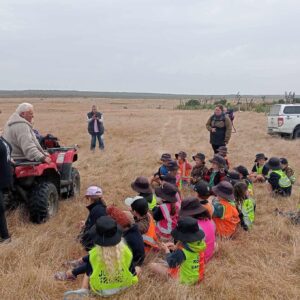Learning support professional Ally Kemplen is in her twentieth year at Newton Central School in Auckland, known as an inclusive school, which attracts parents and their children with extra needs. Her passion and strength is working with children with high behavioural, social and emotional needs and children who have experienced trauma or neglect. This may involve Post Traumatic Stress Disorder or attachment disorder, or the child might not have a diagnosis.
She says she has a simple method of approaching her work.

First base, is understanding these children’s brains are different because of their experiences, they will behave differently, and it is not in order to annoy people. This is how they respond to these situations. Second base, is recognising that when a child is being unlovable that’s when they need the most love. Third base, is knowing they can’t express their needs but they’re telling you something. All behaviour is communication.
“Bring it back down to that when you’re seeing raging and tantruming and throwing chairs across the classroom. ‘You’re not feeling okay, you haven’t even recognised that in your body before you’ve reacted and gone to the back of your brain to fight or flight, you might not even know what the trigger has been and this is the quick response, so I need to help you right now. Berating you right now isn’t going to help. In fact you can’t hear a word coming out my mouth at this point because this part of your brain has completely shut down, so we’re going to have to wait. Even when you look calm, you’ve settled down, you’ve stopped sweating and throwing things, we know we still have to wait quite a bit longer before we can have a conversation’.”
She believes all children should be celebrated and not be seen in a deficit mode. It is important to reward and celebrate achievements, tiny as they may be. This comes from Kemplen’s own experience but she has completed the Positive Behaviour for Learning model.
The Incredible Years programmes for parents and teachers now also have courses for teacher aides.
“If a child can’t tie their shoelaces we teach them, if they can’t count up to 10 we teach them, but if they can’t manage their behaviour around other people we growl at them? It just doesn’t make sense.”
Ally Kemplen
“If a child can’t tie their shoelaces we teach them, if they can’t count up to 10 we teach them, but if they can’t manage their behaviour around other people we growl at them? It just doesn’t make sense. If they haven’t learned things, we’ll help them learn it. They’ve all had different ways of learning to behave. We need to decide within these walls this is how we are going to respect and love each other so we are going to teach you specifically.”
This is a whole-school approach.
“The adults are all different humans and we’re all bringing different skills and gifts and beliefs but we start considering our language and some kind of consistency across the school. We’re seeing such a change for our students. They know if I do this this will be the response I get, no matter which adult is there it will be similar language.”
Her work changes with needs within the school. This year, Kemplen is working across three middle school classes with the priority on learning – her work involving literacy support, one-on-one classroom support, observation. She says she looks forward to schools post-National Standards.
“I think as we come back into a New Zealand Curriculum world where teachers are given an element of trust, that children will continue to work together and will learn from each other more collaboratively which is something I think we do quite well at this school. I know people often comment on that.
“As we keep moving away from that one teacher aide with one student situation, that will just keep improving.”
She points to a wealth of knowledge, research and teaching resources around inclusive education found easily on the Ministry of Education’s Te Kete Ipurangi (TKI) website.
Kemplen also refers to strong British research, The Deployment and Impact of Support Staff which provides a ‘red, amber, green’ self-assessment tool – for ‘not-so-good’ practice, ‘ah-getting-there’ practice, and best practice, which can be used to find ideas for your school.
“Whereas we used to have a learning goal and a social goal and an academic goal, we are now looking specifically at the key competencies.”
Ally Kemplen
Newton Central School, she says, uses “the beautiful thing that is the New Zealand Curriculum” and key competencies for every student, particularly students who have individual educational plans. “That’s been the turnaround – whereas we used to have a learning goal and a social goal and an academic goal, we are now looking specifically at the key competencies.
“For example, we’ll look at managing self – what are the strengths, what can this child do, what do they need support with, how are we going to do that and who’s going to do it? If we want children to be life-long learners, then the literacy and numeracy falls into the key competencies.”
This approach can be understood by everyone who is involved with the child, including parents – for example, the child can get to the bathroom but they need some help with the door and they need some help with their trousers.
“We want our kids to be able, especially the ones who have difficulty emotionally regulating, to eventually recognise when they are not okay and ask for help. So if we’re not doing that then we’re not being very good role models.
“If you have a fake relationship with colleagues or kids they know. If you you’ve been really genuine with each other, you’ve noticed when someone’s not okay, or you’ve given them a little thumbs up when you can see they’re trying hard, and those things happen all the time – then when something goes wrong you’ve got all of that beneath it to figure things out with. It’s got to be really genuine, really strong, really loving relationships.”
Culture before curriculum
The culture of the school has to be in place first, says Donal
McLean, president of the West Auckland Principals Association. At
Fruitvale School where he is principal, culture encompass delivery of
curriculum as well as extra-curricular activities.
Sharing the discussion are deputy-principal and Special Education
Needs Co-ordinator (SENCO) Hine Viskovich and teacher aide/learning
support professional Heather Bodley who is the longest serving staff
member with 30 years at Fruitvale School.

The first two weeks of the year the whole school focuses on values and culture.
Says Bodley: “We bring it into all our interactions, it’s part of
the way we talk to each other particularly how we talk to children in
terms of behaviour and expectations.”
Fruitvale’s culture is based on John Hattie’s principles of Visible Learning and Teaching – when teachers see learning through the eyes of students and help them become their own teachers.
When they talk about how best to deliver the curriculum it means to
all students. They do not talk of children with additional learning
needs separately. In practice, what does that mean for children with
extra learning and behaviour needs? And how can it be done well?
Best practice, says McLean, comes down to managing culture and
teaching support. It’s based on curriculum knowledge and behavioural
management skills. It’s about collegiality and collaboration.
Best practice, says McLean, comes down to managing culture and teaching support. It’s based on curriculum knowledge and behavioural management skills. It’s about collegiality and collaboration.
Says Viskovich: “All those things feed into a teacher with great practice. Sometimes it’s respite. I often say to teachers, if you just want to do something really exciting with the class and not worry, we’ll arrange a parallel alternative activity so you have the opportunity to do that.”
Best practice rests on the teacher knowing how best to engage with a teacher aide in class. Says Bodley, “And it’s having a support person who knows what to do, not the teacher having to tell them or support them, or say ‘please don’t clean my art cupboards, can you sit with someone instead’. That’s experience and personality as well as training.”
Says Viskovich, “We’ve done more training than ever in terms of clarifying their roles and being really explicit about what their interactions should look like with the children and discussing that with them. It is important they have a range of strategies to use for a diverse range of behaviours and responses.”
Training is done by Viskovich who is the lead coach, by Resource Teacher of Learning and Behaviour or at outside training workshops. Among support staff, there are some specialist roles such as ESOL.
Says Viskovich, “Building the relationship is number one because no matter how many key interventions I might know about, I first need a good relationship or a warm relationship with my high-needs child. That’s the first thing a teacher needs to establish. Then build the relationship so there’s trust and they can look to you to ask questions or seek comfort or whatever. Then you bring in your skills and your pedagogies.”
Children with emotional-behavioural spectrum conditions need a learning support professional like Bodley in class.
Well-being of staff is the school’s current focus – manage yourself first, put on your own life jacket before you help the kids into theirs.
Well-being of staff is the school’s current focus – manage yourself first, put on your own life jacket before you help the kids into theirs. Best practice when teaching children with additional learning means working cohesively as a school.
“Visibility is very important to us so that people who are learning support professionals, or kids, parents or teachers or anybody understands why we are doing what we are doing, and how we do it.”
Teacher practice sits inside the culture and rests on collegiality between all staff. “It’s people supporting each other to do the best for the children. There’s a lot of pre-conditions to the child’s needs being met,” says McLean.
“We do a lot around coaching, we respect teacher voice, we want teacher feedback. When they say things aren’t working we’ve got to listen to that. We can’t just think things are happening.”
Sometimes that involves outsiders coming in to get authentic feedback through anonymous surveys.
With a roll of 300, there are five learning support professionals. “Spread within an inch of their lives,” says McLean. “We could do with a couple more and for these guys to be paid properly. But our school continues to run pretty well and that’s only because of the things we talk about around culture and relationships, managing the stresses.”





